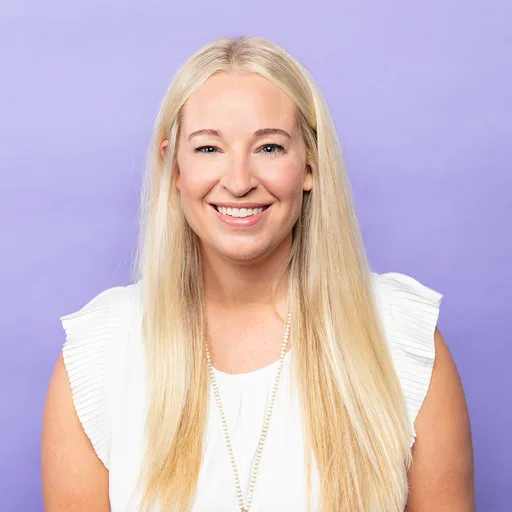Table of contents
If your recruiting team isn't organized, interviews can feel chaotic and overwhelming. But small steps like using interview schedule templates can make a big difference in creating an efficient and effective interview process. Scheduling templates make it easier to set up meetings and structure job interviews, so both interviewers and candidates have a great experience.
Here are three interview schedule templates you can use to improve your hiring process.
Template 1: Candidate interview schedule template
You can create a job interview schedule for different types of interviews (and different types of positions). A set appointment schedule helps keep everyone on track.
An interview schedule template can serve as a valuable training resource for interviewers by helping them understand what should be discussed during each phase of the meeting. This can help ensure that each candidate has an equal experience.
Your interview schedule template should list each section of the interview and how long it should take. This could be as simple as detailing the contents of a one-hour interview appointment. On the other hand, when interviewing a C-suite level candidate, a more intensive, multi-day process may be needed.
For example, an initial one-hour interview with a hiring manager could be broken down into four parts:
Introduction (5 minutes): The interviewers introduce themselves and the company and give a brief overview of what the interview process will look like.
Information about the position (5-10 minutes): Interviewers explain required skills, schedule and salary expectations, and preferred start date. This section may take less time if this information was already provided in the job listing or discussed in an initial phone screen.
Questions for the candidate (30-40 minutes): Interviewers ask questions about the applicant’s relevant past experience and training, as well as soft skills. Depending on the position, this may also include a portfolio review.
Conclusion (10-15 minutes): The applicant has a chance to ask questions about the job and company. After answering, interviewers close the interview by going over next steps.
Depending on your company’s interview process and the role, you may need to schedule additional time for a tour or for meeting other team members.
After the interview is over, the interviewers should typically have some time to debrief. Because of this, most interview schedulers provide some extra time between interviews. This also gives more scheduling leeway in case an interview goes longer than expected.
While you may plan for interviews to only take an hour, we recommend blocking 90 minutes for each interview just in case.
To streamline the interview itself, gather as much candidate-specific information through the job application and initial phone screen as you can. This includes the resume, references, and permission to conduct a background check.
Template 2: Interview scheduling request email template
Templates can also be helpful when sending an interview request. An interview email template allows recruiting coordinators to quickly set up a meeting with top candidates.
When setting up an interview via email, this sample template can serve as a good starting point for your team.
Subject Line: Invitation to Interview with [company name] for [job title]
Dear [candidate name],
Thank you for your interest in [job title] at [company name]. We would like to conduct a [type of interview, such as an in-person or phone interview] to discuss this opportunity and give you a chance to learn more about our company culture.
You will meet with [name of interviewer], our [position of interviewer]. Please plan for about [X number of minutes] for the meeting.
[Add any necessary information about what the candidate needs to prepare for the interview, like a work portfolio].
Click here [add your scheduling link] to schedule an interview. If you need to reschedule or require any special accommodations, please contact me at [phone number or email address]. We look forward to hearing from you soon!
Sincerely,
[name and position of hiring manager or recruiting coordinator]
In this template, the recruiting coordinator shares an online scheduling link rather than asking interviewees if they’re available at a specific time. When you give candidates the option to self-schedule their interview, you can significantly cut down on the back-and-forth that often occurs when trying to coordinate schedules via email. This creates a better candidate experience and speeds up the hiring process.
Scheduling automation also lets recruiting coordinators schedule interviews more efficiently, which can be especially important when you’re trying to fill multiple positions.
E-book: The ultimate guide to recruiting coordination
Template 3: Interview questions template
To keep the interview agenda on track, it’s also helpful to have a template for questions, responses, and interviewer notes.
This interview template will typically include a standard set of questions to ask each candidate and areas where interviewers can take notes on the candidate’s responses. In addition to helping you assess if the candidate is a good fit for the role, asking each candidate the same interview questions can help ensure applicants are treated fairly and mitigate unconscious bias.
The best questions will help interviewers understand a candidate’s position-specific abilities, experience, and soft skills. These open-ended questions give you real insights into a candidate’s qualifications.
Many applicant tracking systems (ATS) provide spaces to enter interview questions for each job and for interviewers to take notes. Here are some standard structured interview questions you can copy and paste into your ATS (or a Google doc!):
Why do you want to work for [company name]?
What experiences have prepared you for this position?
What is your experience with [relevant skill or task for the job]?
Do you prefer to work in a team or on your own?
How do you deal with workplace conflicts?
Describe your biggest success in a previous role.
Describe a time in a previous role when a project didn't succeed. What did you learn from it?
These are just a few ideas to help you get started. Questions should be adapted for each role you’re hiring for.
Another option is to provide an interview questions template with several subcategories (such as experience, ability to work in a team, skills assessment, etc.). Each subcategory should have three or four questions, so interviewers can choose one to two questions per category to ask. This can provide some needed flexibility and variety while ensuring that every interview follows a standard structure.
Recruiting Week 2023: A virtual series for talent acquisition professionals
Create a better candidate experience with interview schedule templates
Interview schedule templates may seem small, but they can have a big impact on the candidate experience. When a recruiting team follows templates for scheduling and conducting interviews, they can ensure each interview is efficient, informative, and fair.
Calendly's scheduling automation platform can automate your interview scheduling process, so you can stop playing calendar Tetris to schedule interviews. By helping your team spend less time on logistics, you can focus more on delivering an amazing interview experience — and quickly fill your company’s open positions with top talent.
Get started with Calendly
Related Articles
Don't leave your prospects, customers, and candidates waiting
Calendly eliminates the scheduling back and forth and helps you hit goals faster. Get started in seconds.
Calendly eliminates the scheduling back and forth and helps you hit goals faster. Get started in seconds.

